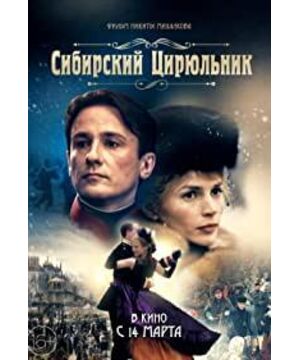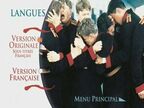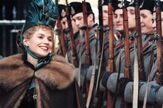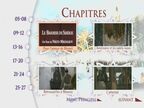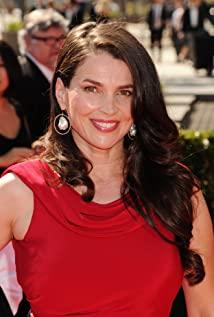The Russia in "The Barber of Siberia" is indeed idealized - the Russian land is covered with continuous birch forests, on the traditional Russian meat festival, there are officers drinking a thousand glasses of vodka, the Moscow River is icy and snowy, shirtless The men forget each other's hatred after fistfighting. In the resplendent hall, handsome non-commissioned officers dance gracefully. On the solemn red square, the tsar riding a white horse inspects his mighty army. Young people who fight for love with swords and duels are destined to Tragedy but still reckless profligate passion, these are only Russia's broadness, sophistication, compassion and wisdom that Mikhalkov upholds. But perhaps these glamorous flashes belong more to classical Russia. So in this film, the director shows the audience the vibrant Russia in his fantasy, the Russian in the fantasy and the Russian love in the fantasy - a beautiful encounter in the carriage, but in the end a passionate young man is banished to Snow-covered Siberia.
Although the film is 210 minutes long, the director presents the audience with a love story that transcends time and space with a rather fluid and refined narrative. Admittedly, there's a very distinctly American sense of humor in this film, but it's by no means a joyous film, with the first half bringing tears of laughter and the second half smiling bitterly.
The film Nikita Mikhalkov did not disappoint, at least visually dizzying, and captured the soul of Russia.
The film's historicity is thin and unbelievable, the political views are not unique, the dramatic conflict is unconvincing, the comedy isn't funny at all, and the part where a grand piano slid across the waxed floor is better than anything else. The actors' performances are charming.
"The Barber of Siberia" is the director's best effort to show the world the vast and boundless Russian land, such as young people who are full of passion under the instigation of song, dance and spirits, the game of shirtless men fighting in the ice and snow, the tsar in the red Field review ceremony, etc. The director borrowed these footage to try to awaken the Russians' reflection on such a predicament. For this reason, the first half of the film shows the beautiful traditional culture of Russia, and the second half alludes to the sense of crisis that European civilization has brought to Russia. The logging machine It is a symbol of European civilization.


